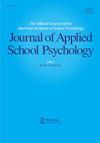Barriers to Universal Mental Health Screening in Schools: The Perspective of School Psychologists
IF 1.5
Q4 PSYCHOLOGY, EDUCATIONAL
引用次数: 11
Abstract
Abstract Many young people with mental disorders are not identified until some years after the first onset of symptoms and then frequently do not receive professional intervention. One promising strategy to better identify these young people is mental health screening in schools. Despite a growing literature on the benefits of school-based screening, it remains a relatively uncommon practice and little is known about the practices of those schools that do screen. Moreover, the barriers that prevent schools from screening are not well understood. This study reports on the perceptions of school psychologists about universal mental health screening in schools regarding the prevalence of screening; the practices within schools that do screen; and the perceived barriers to implementing screening. Results indicated that screening remains uncommon, with only 14.8% of school psychologists working in schools that screened in the previous 12 months. The most significant barriers to screening related to being adequately resourced to implement programs, and particularly concerns about how to follow-up students identified as being at-risk. Despite this, school psychologists endorse the potential benefit of screening and report being likely to run screening programs if perceived barriers could be reduced. Impact and Implications statement Universal mental health screening in schools remains uncommon. The main perceived barriers relate to adequate resources – partly in terms of available time - and to management of at-risk students. Despite these barriers, school psychologists see school-based screening as useful for student wellbeing.从学校心理学家的角度看学校普遍心理健康筛查的障碍
许多患有精神障碍的年轻人直到首次出现症状数年后才被发现,然后往往没有接受专业干预。更好地识别这些年轻人的一个有希望的策略是在学校进行心理健康检查。尽管关于以学校为基础的筛查的好处的文献越来越多,但它仍然是一种相对不常见的做法,而且对那些进行筛查的学校的做法知之甚少。此外,阻止学校进行筛选的障碍还没有得到很好的理解。本研究报告了学校心理学家对学校普遍心理健康筛查的看法,包括筛查的流行程度;学校里进行筛查的做法;以及实施筛查的障碍。结果表明,筛查仍然不常见,在过去的12个月里,只有14.8%的学校心理学家在进行筛查的学校工作。筛查的最大障碍与是否有足够的资源来实施项目有关,特别是如何跟进被确定为有风险的学生。尽管如此,学校心理学家支持筛查的潜在好处,并报告说,如果可以减少感知障碍,可能会开展筛查项目。影响和影响声明在学校普遍进行心理健康检查仍然不常见。人们所认识到的主要障碍与足够的资源(部分是在可用时间方面)和对有风险学生的管理有关。尽管存在这些障碍,但学校心理学家认为,以学校为基础的筛查对学生的健康有益。
本文章由计算机程序翻译,如有差异,请以英文原文为准。
求助全文
约1分钟内获得全文
求助全文
来源期刊

Journal of Applied School Psychology
PSYCHOLOGY, EDUCATIONAL-
CiteScore
2.40
自引率
10.00%
发文量
7
期刊介绍:
With a new publisher (Taylor & Francis) and a new editor (David L. Wodrich), the Journal of Applied School Psychology will continue to publish articles and periodic thematic issues in 2009. Each submission should rest on either solid theoretical or empirical support and provide information that can be used in applied school settings, related educational systems, or community locations in which practitioners work. Manuscripts appropriate for publication in the journal will reflect psychological applications that pertain to individual students, groups of students, teachers, parents, and administrators. The journal also seeks, over time, novel and creative ways in which to disseminate information about practically sound and empirically supported school psychology practice.
 求助内容:
求助内容: 应助结果提醒方式:
应助结果提醒方式:


